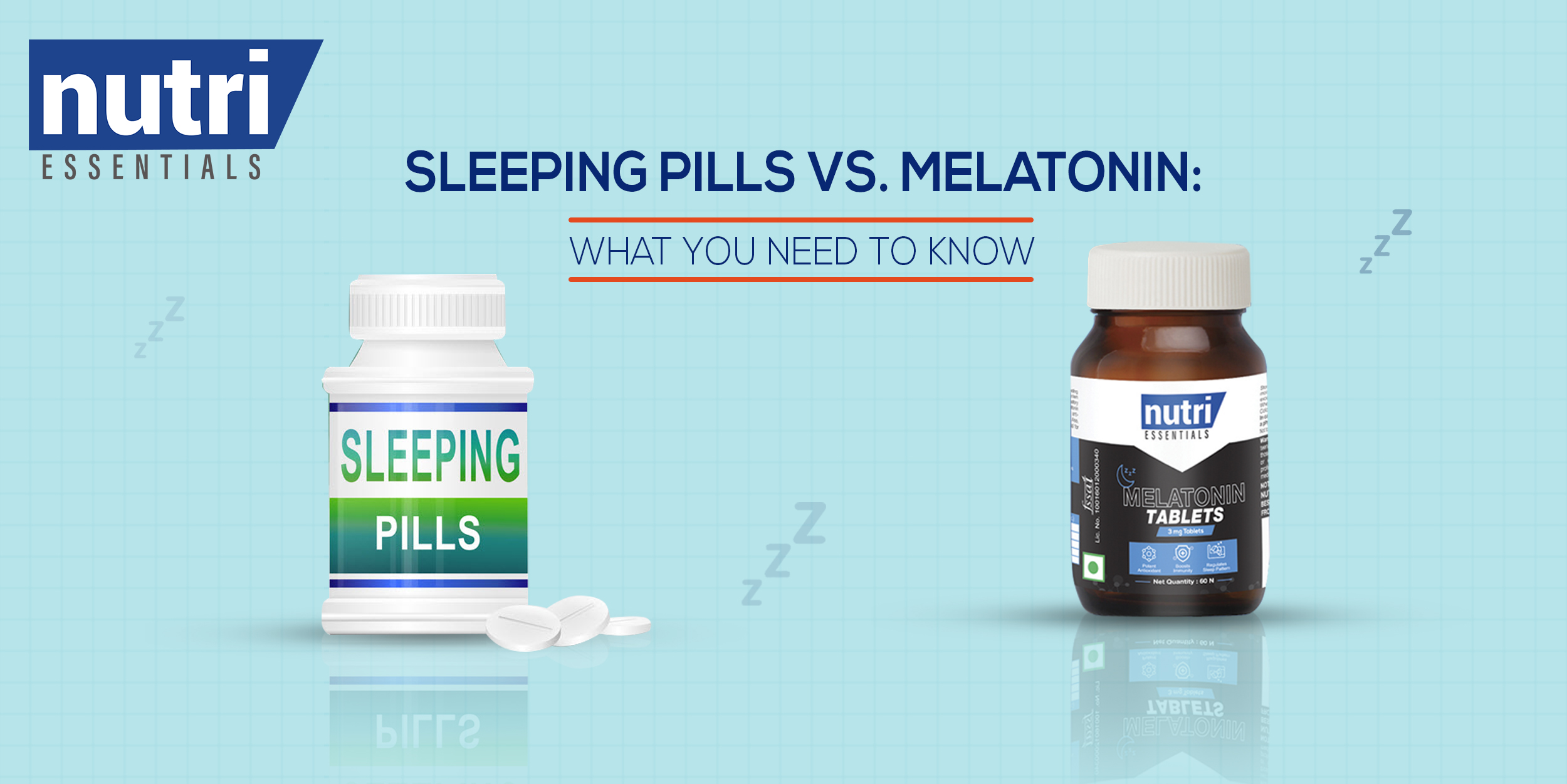Quality products for you & your family to stay ahead in life.

When sleep patterns get disturbed, and you don't get the sleep, it's tempting to turn to look for a prescribed solution for relief. If you're looking for a solution, know that melatonin and sleeping pills promote sleep through different mechanisms.
Melatonin is a hormone prepared by the pineal gland and signals to your internal clock that it's time for bed. During the day, Melatonin levels are logically low. However, when the sun sets, your brain's melatonin centre (the pineal gland) releases a burst into your bloodstream to send sleep-promoting signals throughout your body. Your brain continues to produce melatonin into the middle of the night so that the generated melatonin makes you progressively drowsier until you, preferably, fall asleep.
Prescribed melatonin helps in situations where your body is not producing enough melatonin. People commonly use melatonin for insomnia and improve sleep in different conditions, such as jet lag. It is used for other ailments such as depression, chronic pain, dementia, and many other conditions. In addition, melatonin has been used to cure sleep disorders, including disrupted circadian rhythm cases where patients are misaligned with their natural sleep cycle.
Supplemental Melatonin has been recommended for many uses, curing from sleep disorders to cancer treatment. However, everybody reacts differently to medicines and supplements, so melatonin may or may not work for you depending on how your body reacts to it. When taken as a supplement, its purpose is to imitate the sound effects of the natural sleep hormone. Sleepiness typically occurs within 30 minutes after taking a dose.
Taking supplemental melatonin for sleep may not be the best approach for all sleep disorders. Consult your doctor about the optimum practice of dosing. This medication may vary from person to person. Melatonin is often touted as a "natural" sleep aid without considering the impact of disrupting a key hormone system in your body.
Though melatonin has fewer side effects than other sleep cure medicines, certain side effects which can be seen by those who are taking melatonin are:
- Daytime sleepiness
- Body pain or headaches
- Stomach upset
- Dizziness
- Stress and anxiety
- Crankiness
- A "heavy head" feeling
- Depression
Melatonin supplements might bring difficulties if taken along with some other medicines, including:
- Birth control pills
- Diabetes drugs
- Blood-thinning medication
Be aware that regular melatonin usage may harm your body routine. Your brain is constantly sampling the melatonin in your bloodstream, and if it senses that melatonin is overproduced, it may slow down and hamper its production.
What Are Sleeping Pills?
"Sleeping pill" is a general term used to illustrate prescription and over-the-counter medications. Most extensively available sleeping pills aim at receptors in your brain to slow down your nervous system. These receptors, known as GABA, are mainly accountable for inhibiting movement in your brain. By activating them, sleeping pills slow down the actions of the brain to the extent that you fall asleep.
Are Sleeping Pills Risky?
The regular intake blankets the brain to guarantee a dampening effect. This can show the way to cognitive side effects such as feeling tired or forgetful. Sleeping pills are also called "sedative-hypnotics" for their ability to stop the activity in the brain. Resulting in, some pills may cause abnormal sleep time brain waves when compared to natural sleep. Over time, a body can build up acceptance to sleep aids and risk depending upon them. These medications can also cause withdrawal symptoms. Rather than relying on these pills, you can take up a new practice like meditation, adjust your meal times to your body's natural rhythm.
Why Take It?
People prefer to take this when they have insomnia, where they face trouble falling asleep and staying asleep. But, unfortunately, this also results in delayed sleep disorder.
What to Avoid?
- Avoid driving or operating machinery until the drowsy effects are no longer present.
- Avoid using this medication with other treatment medications,
- Avoid alcohol while taking this medication.
- Avoid coffee, tea, cola, energy drinks, or other products that contain caffeine or higher caffeine quantity, as it may offset the effects of the melatonin.
Is Melatonin Safe?
Melatonin is a relatively safe supplement when used in the short term. In addition, this medication appears to be relatively nontoxic, even at higher doses such as 3 to 5 mg once a day.
Higher external doses can increase the worst effects like daytime drowsiness, impaired physical or mental ability, low body temperature, and elevated melatonin levels.

